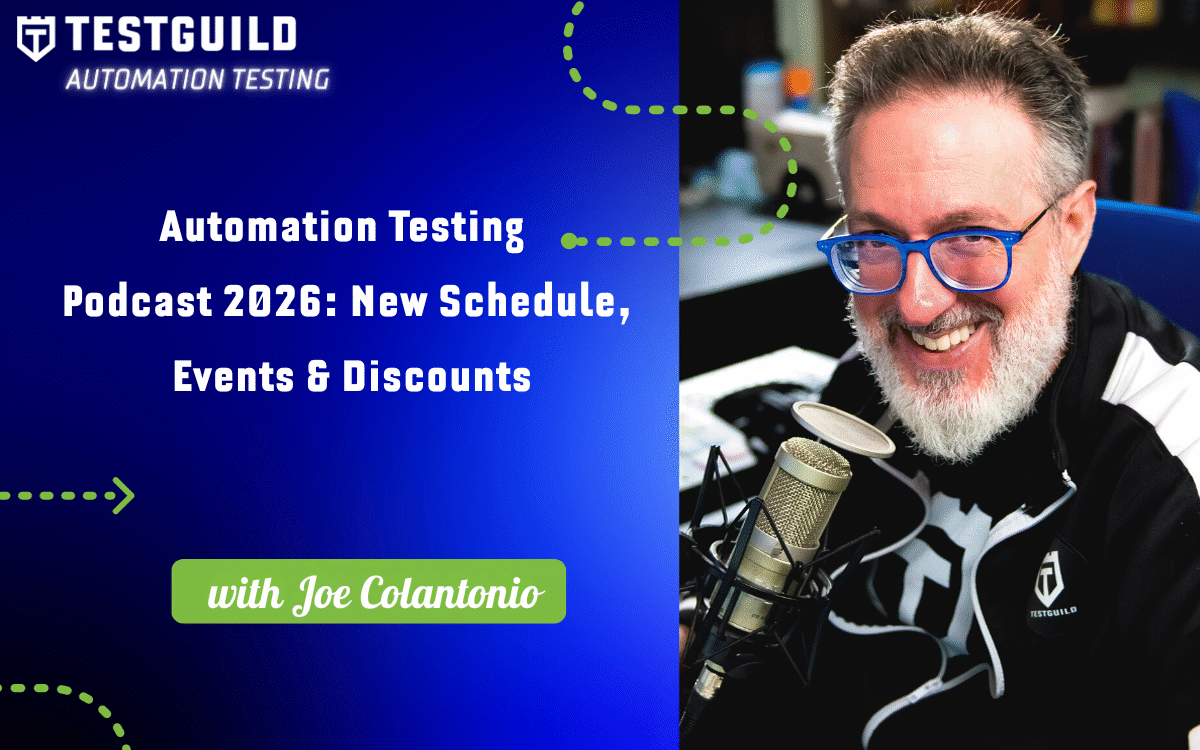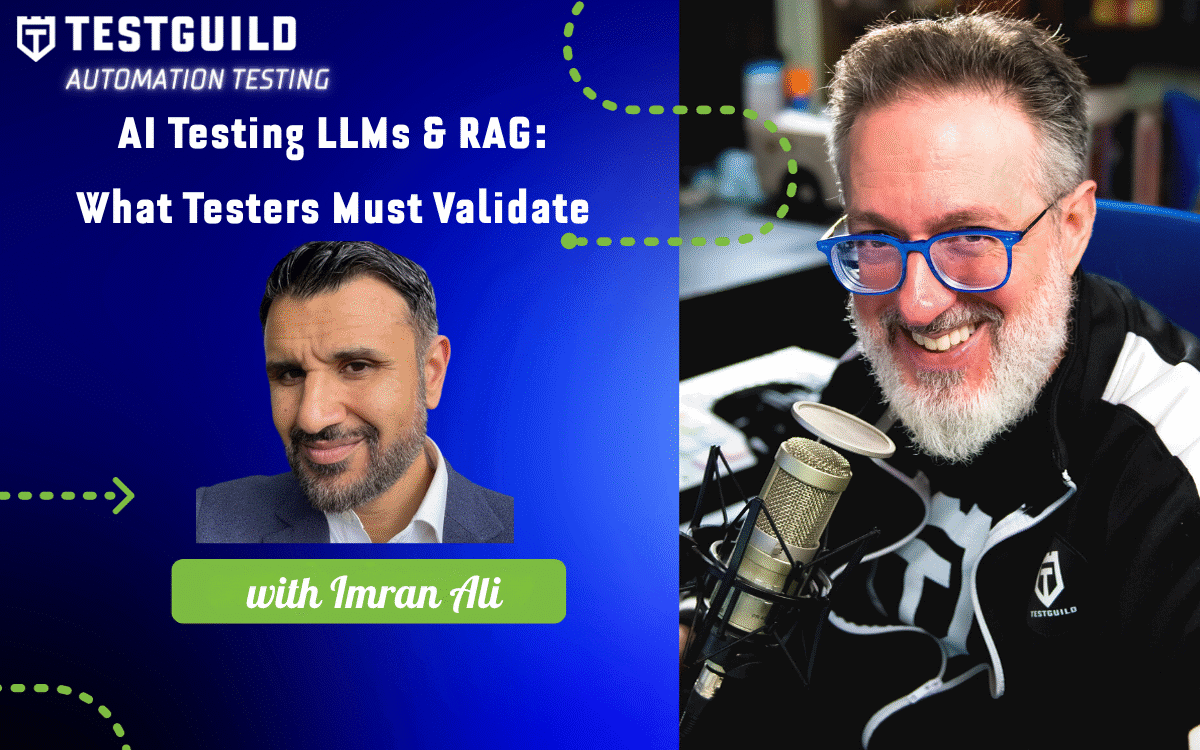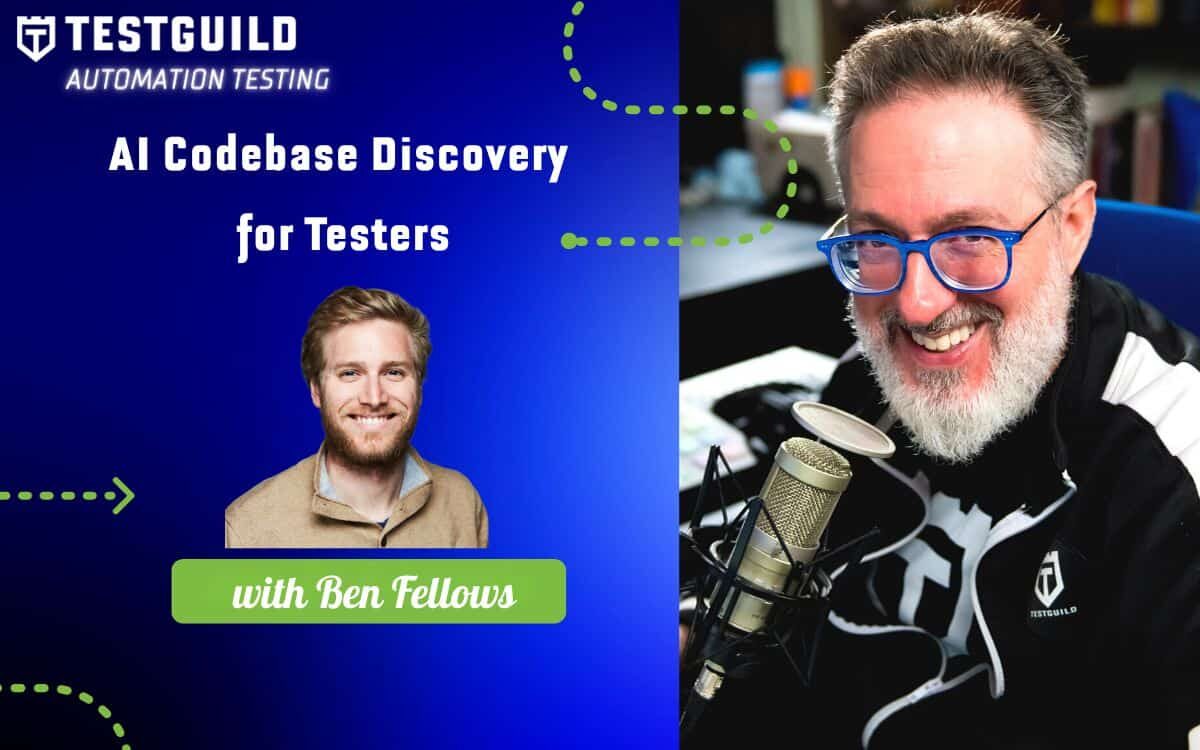About This Episode:
Is Cypress about to change how you write automation forever?
Are you spending more time coordinating deployments than actually testing?
Should you trust AI to generate your Playwright scripts?
Find out in this episode of the Test Guild New Shows for the week of Oct 26th. So, grab your favorite cup of coffee or tea, and let's do this.
Exclusive Sponsor
Discover ZAPTEST.AI, the AI-powered platform revolutionizing testing and automation. With Plan Studio, streamline test case management by directly importing from your common ALM component into Plan Studio and leveraging AI to optimize cases into reusable, automation-ready modules. Generate actionable insights instantly with built-in snapshots and reports. Powered by Copilot, ZAPTEST.AI automates script generation, manages object repositories, and eliminates repetitive tasks, enabling teams to focus on strategic goals. Experience risk-free innovation with a 6-month No-Risk Proof of Concept, ensuring measurable ROI before commitment. Simplify, optimize, and automate your testing process with ZAPTEST.AI.
Start your test automation journey today—schedule your demo now! https://testguild.me/ZAPTESTNEWS
Links to News Mentioned in this Episode
| 0:18 | Cy Prompt Free Trial | https://links.testguild.com/lrsh1 |
| 0:59 | CyPrompt Demo | https://testguild.me/fgaiqr |
| 1:11 | Playwright Webinar | https://testguild.me/djmtwi |
| 2:29 | AI Change Tax | https://testguild.me/og4p6g |
| 3:57 | Shift-UP | https://testguild.me/he21y6 |
| 6:04 | MCP Appium Update | https://testguild.me/jt5ake |
| 6:57 | MCP Playwight +Claude | https://testguild.me/wzwmyf |
| 8:54 | ZAPTESTAI | https://testguild.me/ZAPTESTNEWS |
News
[00:00:00] Joe Colantonio Is Cypress about to change how you write automation forever? Are you spending more time coordinating deployments rather than actual testing? And should you trust AI to generate your Playwright scripts? Find out in this episode of the Test Guild News Show for the week of October 26th. So grab your favorite cup of coffee or tea and let's do this.
[00:00:19] Joe Colantonio First up is a big announcement from Cypress. They just released a new Cyprompt, which is all about AI commands that turn plain English into runnable tests. So, for example, if you use steps like click add to cart or verify total is, I don't know, 1300. Cypress will map those to selectors and actions right in their runner. So your team gets basically three wins out of this new feature. First is faster authoring. It also comes with self-healing. So when your selectors change, no problem, it regenerates the step. And you also get deterministic CI by being able to export the AI generated steps into real Cypress code. And there's a lot of other great features that you get using this as well. Well, you want to see this in action? Well, I actually broke a UI I was testing on purpose and my test still passed and you can see how it handles all this. You can check out my full demo in that link down below.
[00:01:11] Joe Colantonio Speaking of AI power test generation, if you're working with Playwright, there's webinar coming up that promises similar time savings. So I'll be hosting this webinar of the week, which focuses on AI to accelerate Playwright test creation and maintenance. And the session will feature a live demonstration of an AI test engineer that can analyze a new project and generate complete end-to-end test coverage in minutes rather than the weeks or months traditional approaches sometimes require. This webinar is going to address common pain points teams encounter with Playwright like slow tests, authoring fragile locators that break frequently and the ongoing burden of test maintenance. Attendees will see how AI-driven approaches tackle these issues through self-healing capabilities. And approve locator strategies that will help you reduce your test flakiness. And the experts from Blink.io told me that they're going to cover 5 specific areas, how to generate, heal and scale Playwright tests, best practices for onboarding new projects with AI assistance, techniques for reducing flakiness through self-healing, methods for integrating AI-built tests into your CI/CD pipelines and practical steps your team can take right now to help adopt AI power testing. Registration is now open. Those unable to attend the live session can still register to receive the replay. So make sure to register now using that link down below. Hope to see you there.
[00:02:29] Joe Colantonio Now, all this talk about AI generated tests faster sounds great, but let me ask you something. If you can create tests in minutes instead of weeks, what happens to everything that comes after? Well, this next article is all about that. James actually published this a few weeks ago, but I just saw it and it examines how AI coding tools have created a coordination crisis in software delivery. And James argues that while AI has accelerated co-writing by 10 times, it has left deployment and coordination processes unchanged, creating what he called a compounding change tax. And according to James, tasks that took six months to build 18 months ago now ship in weeks due to AI coding tools like Cursor and Claude. But he cites a 2025 DORA report which found that while developers are writing code 10 times faster with AI, deployment velocities have increased by only 20%. He goes on to argue that this is creating cascading impacts, including test environment updates, quality check reconfigurations, outdated documentation, and downstream system coordination. What do you do? Well, he proposes 5 immediate actions. First is measure coordination overhead from code complete to production. Second is map data dependencies, starting with one critical data product. Implement Schema Contracts and Versioning. Automate impact notification to replace minimal coordination and establish coordination as code patterns by encoding coordination rules. Right. James pointed out AI is changing the way we do things.
[00:04:01] Joe Colantonio And in fact, there's also a growing movement that says that old shift left models don't cut it anymore as well when AI is in the mix. And this article is by John Robinson, who's been an awesome Automation Guild contributor over the past few years. He's published an article arguing that traditional shift left and shift right testing models no longer adequately address modern software development challenges. So John introduces a concept he calls shift up, which reframes testing from a linear timeline approach to what he describes as vertical integration across the entire software development lifecycle. And he goes on to argue that shift left and shift right was designed for traditional pipelines where testing happened either earlier or later in development. However, the emergence of agentic systems, AI-driven workflows and data centric applications that expose limitations and this thinking. And according to John, quality is no longer a phase or boundary, but spans the entire development process. So shift up focuses on how high in the collaboration stack testing should begin rather than when it should occur. This means testers work with developers, data engineers, and prompt designers before the first user story is even written when agents, models, and contextual logic are being defined. John also emphasized that AI-driven systems, logic often exist in model weights, fine-tuning parameters, or retrieval context, rather than traditional code requiring early collaboration and shared ownership to validate. And he also outlines 4 implementation components. First one is a code design phase where QA partners with engineers. Second, a unified contextual repository serving as a single source of truth for test data, prompts, configuration, and validation rules. Third, continuous validation that triggers tests not only when code changes, but also when data sets, APIs, or configurations change. And fourth, feedback loops using live telemetry, user feedback, and drift detection. Really cool article and insight, and definitely could check out more about it using the link down below.
[00:06:05] Joe Colantonio Another LinkedIn article that caught my eye this week is by Sai, who just announced a major update to MCP Appium. And he goes on how this update includes four improvements to the tool. First, multi-device handling now allows users to run tests against specific devices more easily. Second is enhanced gesture support provides more fluid, accurate, and consistent gesture execution. Third, the update eliminates the requirement for Appium setup. Enabling users to start right on the box without the standard Appium configuration processes. And fourth, WebDriver agent setup for iOS has been simplified. And according to Sai, MCP Appium now functions as a plug and play solution for mobile testing with minimal setup requirements. The tool is available on GitHub if you haven't checked it out yet. Definitely Cy encourages users who find the tool useful to start the repository and also share it with others.
[00:06:57] Joe Colantonio So MCP Appium isn't the only MCP tool making waves. One test architect has been experimenting with connected Playwright MCP to Claude AI, and he's provided a really honest take about what works and what doesn't. And so this is by Michal, who is a testing expert who runs a blog testingplus.me. He just published a new article about connecting cursor with the official Playwright MCP to control browser actions from a large language model and draft end-to-end tests. And the article covers several key areas. First, it explains the set up process for MCP tools and cursor. Second, discusses snapshot versus vision models and guidance on when to use each approach. Third, he details core actions including navigate, click, and snapshot functions, along with code generation capabilities. And fourth, it identifies specific limitations including context size constraints, lack of determinism, no direct API control, and risk related to bot detection. And according to the article as well, he goes off how AI can accelerate the drafting process, but testers should review both prompts and generate code with professional scrutiny. All right. All these AI tools promise to make our lives easier, but here's a wake up call, even the biggest cloud providers are immune to automation failures. And you probably know what I'm talking about. It's the recent AWS outage, which should make every tester think twice about their testing strategy. And according to AWS's investigation, the technical root cause was a software race condition in DNS systems. Analysis reports indicate that this incident highlights the need for more robust NDS configuration and redundancy within cloud architectures to prevent cascading failures. AWS's own investigation noted that while the highly automated nature of its systems can be efficient, it can also introduce unforeseen vulnerabilities, if not, meticulously tested and managed. And I think this is something John's shift up can help with. Before we go, don't forget, if you want to modernize your testing, check out our sponsor, ZapTest AI's AI-driven platform that supercharges your automation efforts. Their intelligent co-pilot generates optimized code snippets while their planned studio streamlines test case management effortlessly experience the power of AI in action with their crazy risk free six month proof of concept featuring a dedicated Zap expert at no upfront costs. Support the show and check it out for yourself by going to TestGuild.me/zaptestnews.
[00:09:22] All right. For links of everything of value we've covered in this news episode, head it over to the links in the comment down below. So that's it for this episode of the Test Guild News Show. I'm Joe, my mission is to help you succeed in creating end-to-end full stack pipeline automation awesomeness. And as always, test everything and keep the good. Cheers.
Sign up to receive email updates
Enter your name and email address below and I'll send you periodic updates about the podcast.




